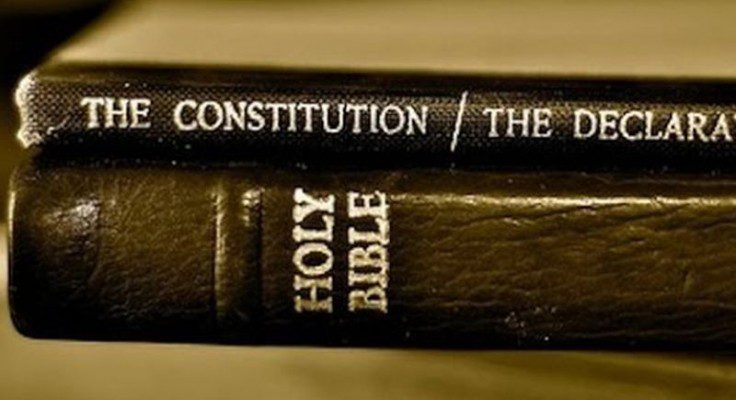When he wasn’t picking fights with our allies; or Tweeting war threats in the middle of the night; or appointing a grotesquely unqualified Secretary of Education, or appointing a known white supremacist to the National Security Council; or de-funding the NEA; or dismantling the EPA… wait, I think I was going somewhere with this.
Right. When he wasn’t busy with all of these other equally appalling and shady dealings, the new President promised to roll back the Johnson Act–the thing that keeps the separation of church and state intact, and prevents churches (and other tax-exempt entities) from endorsing political candidates.
Maybe I don’t need to tell you why this is a terrible idea. Regardless of your political or religious leanings, you probably know why it’s a scary prospect. But just so we can all have various and informed talking points when engaging this matter with our elected officials–which I urge you to do, loudly and often–let’s explore some of the main reasons to keep a firm boundary in place between the government and our religious organizations.
- Thing One in this matter will always and forever be this: the Separation of Church and State is the First Amendment to the U.S. Constitution. The idea that politics and religion should not mix was the number one founding principle of this country, and is a core principle of our national identity. It has become clear that the fabric binding democracy is tenuous as it is. If we start dismantling our primary binding covenant in such a fundamental way, then what falls apart next?
- It’s a bogus proposition, and purely political posturing. Trump made this promise at the National Prayer Breakfast. Right after he asked them to pray for the ratings of his reality TV show. Which, presumably, he is no longer profiting from because that would be a conflict of interest. Anyway, right after that, he started on this stump about repealing the Johnson Act so that “churches could speak freely.” But let’s be real, churches do speak freely. Pastors, for the most part, say what they want from the pulpit, and few churches have ever (ever) lost their tax status because of it. While clergy are expected to refrain from directly endorsing a particular candidate by name, we can speak freely about policies, rhetoric, and platforms that do harm to the poor and vulnerable. And pastors have always been free to speak against abortion, or LGBT rights, etc, if that is what they believe. In either case, when we speak on these issues, we are far more likely to lose a ‘big ticket’ donor to the church than we are to lose our tax-exempt status. This is just more of his pandering to a faith-based audience he is trying to learn and connect with–and, clearly, he is fumbling his way in the dark.
- The Johnson Amendment does not just pertain to churches, it pertains to all non-profit organizations. The tax-exempt entities in our local communities serve a large population–women, children, the homeless, the mentally ill, veterans, the elderly, and the mentally ill. Like churches, these organizations are free to speak out on issues of policy that affect the populations they serve; but if they were to wander into the candidate-endorsing arena, that muddies the waters of their mission. Not to mention makes them vulnerable to intimidation, and even the withholding of public funds, from local and state officials who do not agree with their political stances.
- The boundaries of church and state, and the Johnson Act in particular, are not just meant to keep churches from being too politically vocal–it is meant to protect the churches from Government interference. Reversing this measure would not just mean that churches can say whatever they want about politics, it opens the door for the state to control churches–whether directly or indirectly. I sure don’t want to see that happen now–and would conservative churches want that happening with a Democratic President or Congress in place?
- We already know that corporations are in the business of buying politicians. Give enough money to their campaign, use enough clout to get them elected, and you pretty much own them once they’re in office. (Exhibit A, Sam Brownback and the Koch Brothers.) Do we really want to add churches to the entities that can pull the strings on public policy? Not to mention, the churches that would have the capital to make significant campaign contributions are, for the most part, going to be of the extremely conservative persuasion. Which everybody knows, which is why DJT was making promises to this particular crowd, etc etc. It all smacks of a particular scene in scripture when a certain Adversary said to Jesus “Just worship me and ALL THIS WILL BE YOURS.” You don’t need a seminary degree to see that connection. Bottom line is, I don’t especially want Franklin Graham, and others of his ilk, to have any more political capital than they already do. And neither do you, even if you happen to agree with his particular ideology.
- Speaking of corporate influence in public policy– a clergy friend of mine pointed out yesterday that, if churches were able to vocally and financially support politicians, then church MEMBERS could use the church to launder their political contributions. They could funnel hundreds of thousands of dollars through the offering plate and direct it straight to a particular candidate or party; thus allowing them to give far more than is legal through conventional venues. The possibilities are chilling.
- As a pastor, I hold this as the clearest, most concise reason of all: we do not want to see the Church reduced to a mouthpiece of the government. In the last few decades, we have already lost a great deal of authority, as more and more people come to view us as an outmoded, irrelevant platform of hate, outmoded morality and judgment. I fight hard against that image every day, as does every other faith leader that I know. If, all of a sudden, churches start publicly stumping for political candidates, we become a caricature of our former selves… a sell-out to the powers we have always claimed as lesser than the authority of God, and a slave of Caesar. In addition to losing all credibility within our local communities, we have also abandoned the gospel itself when we pledge our allegiance to either arm of a two-party body of government.
We know that government, and its two-party system, to be deeply flawed. If we feel, from time to time, that a certain party is leaning more towards the directives of our faith, while another wanders farther away, then we are certainly free to say so. We won’t go to jail, we probably won’t lose our 501c3 status, and most likely, we won’t be deported. Start messing with any part of the tenuous boundaries that protect our faith communities from the government–and vice versa–and we can’t be sure that any of that remains true. If we truly honor the Bible and the Constitution, then we must continue to protect them dangerous intertwining…lest they render each other silent.













